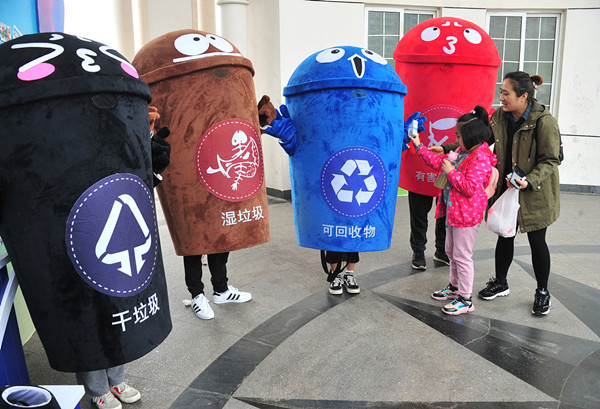垃圾分类 garbage sorting
《上海市生活垃圾管理条例》将于7月1日正式开始实施。该条例在建立健全全程分类体系的同时,分设了促进源头减量和资源化处理专章,将管理范畴延伸到两端,涵盖了全链条。

According to the regulation, people are required to sort household garbage into four categories — dry garbage, wet garbage (kitchen waste), recyclables and hazardous waste — and individuals who fail to do so will be fined up to 200 yuan. For companies and institutions, the fine can go up to 50,000 yuan. In addition, transport operators can refuse to pick up the garbage if it's not properly sorted.
根据条例规定,人们须将家中的垃圾按照干垃圾、湿垃圾(厨余垃圾)、可回收物以及有害垃圾这四个类别放置,如果个人没有将垃圾分类投放最高罚款200元人民币,单位混装混运最高罚款5万元人民币。此外,未经分类的垃圾,收运单位可以拒绝接收。
【单词讲解】
Garbage,rubbish, trash 和 waste 在英语里都有“垃圾、废物”意思,它们的区别在于在哪个说英语的国家更常用。Garbage 是垃圾的美式英语说法;rubbish 是英式英语垃圾的意思;trash 也是美式英语垃圾的意思,但是它也可以用来指不值得尊重的人;waste 是一个正式用语,指没有利用价值的东西,包括废品、垃圾、废物、废料或者指时间、金钱、精力等的浪费。
除了居民个人垃圾分类要求外,条例针对特定对象提出了强制性要求。
According to the regulation, if not requested by guests, hotels should not provide disposable slippers and shower caps, while restaurants and food delivery businesses should not provide disposable cutlery.
条例规定,旅馆不得主动提供拖鞋、浴帽等一次性日用品,餐饮服务提供者和餐饮配送服务提供者不得主动提供一次性餐具。
Government and public institutions are not allowed to use disposable cups in the office and should give priority in purchasing products made from recycled materials.
党政机关、事业单位内部办公场所不得使用一次性杯具,采购时应优先选择由可回收材料制成的产品。
All the courier companies that operate in the city should use digital orders and environment friendly materials for packaging.
上海所有快递企业都应使用电子快递单,使用环保材料包装。
嫌每天给家里垃圾分类很麻烦?据说现在已经有上门代收垃圾服务(garbage pick-up service)了,市民在出门前将打好包的垃圾放在家门口(place their bagged household garbage at doorstep),每天上午定时都会有专人负责拿走,每次服务支付1元人民币的费用。

